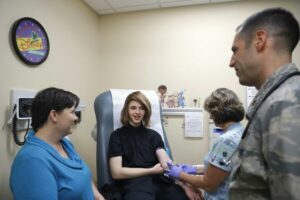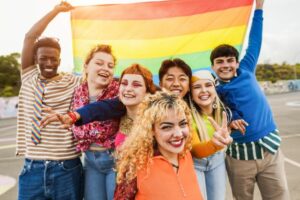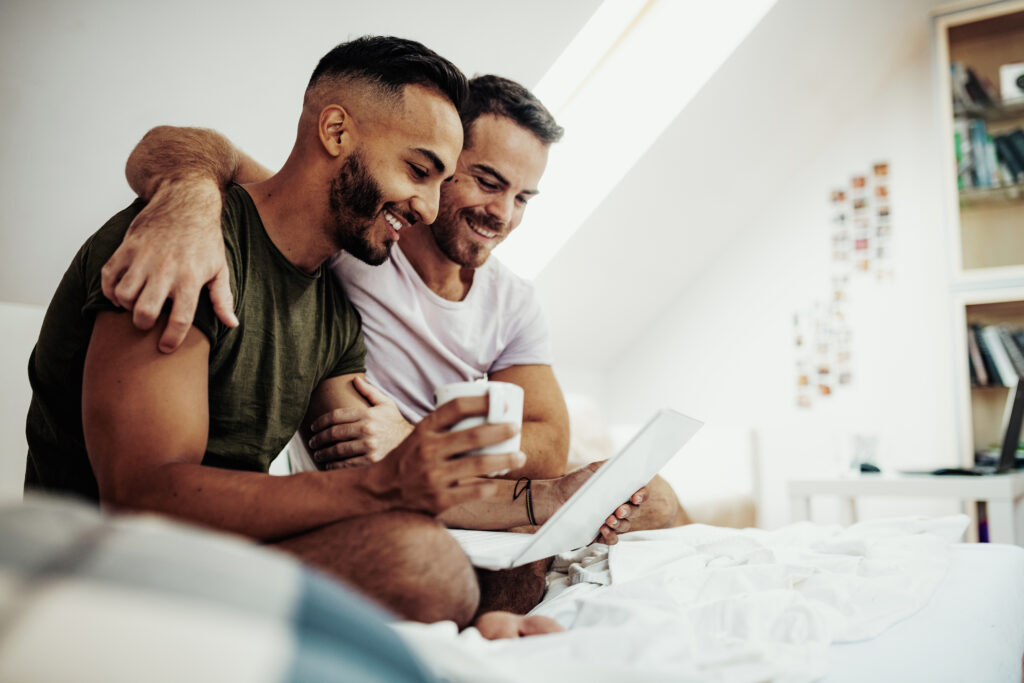Are you and your partner part of the LGBTQ+ community and facing challenges in your relationship? Do you feel the need for guidance and support to navigate the unique issues that arise in LGBT relationships? Seeking the help of an LGBT couples therapist can provide a safe and inclusive space for you and your partner to work through your difficulties, enhance communication, and build a stronger foundation for your relationship. In this article, we will explore the importance of therapy for LGBT couples, the benefits it offers, and how to find the right therapist who understands and respects your experiences.
Contents
Introduction
Relationships can be complex and challenging, requiring effort, understanding, and effective communication. This holds for all couples, regardless of their sexual orientation or gender identity. However, LGBT couples often face distinct challenges that can impact their relationship dynamics.
These challenges may stem from societal discrimination, internalized homophobia or transphobia, coming out experiences, or unique dynamics within same-sex relationships. LGBT couples therapy aims to address these specific concerns and support couples in their journey toward a healthier and more fulfilling relationship.
Understanding LGBT Couples

LGBT stands for lesbian, gay, bisexual, and transgender. This acronym encompasses a diverse range of sexual orientations and gender identities. Lesbian refers to women who are emotionally, romantically, or sexually attracted to other women.
Gay is often used to describe men who are emotionally, romantically, or sexually attracted to other men. Bisexual individuals are attracted to both men and women, while transgender individuals have a gender identity that does not align with their assigned sex at birth.
LGBT couples face unique challenges that may differ from those experienced by heterosexual couples. Discrimination, prejudice, and stigmatization can impact various aspects of their relationship, including family acceptance, societal norms, and legal rights. These external factors can lead to increased stress, mental health concerns, and strained interpersonal dynamics within the relationship.
Importance of Therapy
Therapy plays a vital role in addressing the challenges faced by LGBT couples. It provides a supportive and non-judgmental space where couples can explore their concerns, express their emotions, and work towards resolving conflicts.
LGBT couples therapy offers specialized knowledge and expertise in dealing with the specific issues that arise within same-sex relationships, allowing couples to navigate their journey with greater understanding and resilience.
Benefits of LGBT Couples Therapy
LGBT couples therapy offers a range of benefits that can significantly improve relationship satisfaction and overall well-being. Let’s explore some of these benefits:
Promoting Communication
Effective communication is essential for any relationship to thrive. LGBT couples therapy focuses on improving communication skills, enabling partners to express their needs, desires, and concerns openly. Through active listening and constructive dialogue, couples can enhance their understanding of each other’s perspectives and find healthier ways to resolve conflicts.
Enhancing Understanding
LGBT couples therapy helps partners gain a deeper understanding of the unique experiences and challenges they face as individuals and as a couple. Therapists trained in LGBT issues can provide valuable insights and guidance, facilitating empathy, compassion, and mutual support within the relationship.
Building Resilience
Resilience is crucial in navigating the obstacles that arise in relationships. LGBT couples therapy assists couples in developing resilience by fostering coping mechanisms, strengthening emotional bonds, and encouraging adaptive strategies for managing external stressors. Building resilience equips couples with the tools they need to face challenges and grow together.
Supporting Mental Health
LGBT individuals may face higher rates of mental health concerns due to societal pressures and discrimination. LGBT couples therapy acknowledges the importance of mental health and provides a space for partners to address any individual or collective psychological issues. Therapists can offer guidance, resources, and referrals to additional support if needed, ensuring the well-being of both partners.
Finding the Right LGBT Couples Therapist

Finding a therapist who is knowledgeable, experienced, and understanding of LGBT issues is crucial for an effective therapeutic journey. Here are some factors to consider when seeking an LGBT couples therapist:
Qualifications and Expertise
Ensure that the therapist has relevant qualifications and experience in working with LGBT couples. Look for therapists who specialize in couples therapy and have specific training in LGBT-related issues.
Culturally Competent Therapist
Choose a therapist who demonstrates cultural competence and respect for diverse sexual orientations and gender identities. A culturally competent therapist is sensitive to the unique experiences and challenges faced by LGBT individuals and can provide appropriate support and guidance.
Safe and Inclusive Environment
It is essential to find a therapist who creates a safe and inclusive environment where you and your partner can be your authentic selves without fear of judgment or discrimination. Consider therapists who actively advocate for LGBT rights and create affirming spaces for their clients.
The Therapeutic Process of LGBTQ Couples Therapy
LGBTQ couples therapy, like any other form of couples therapy, aims to help individuals in same-sex or gender-diverse relationships navigate their unique challenges and strengthen their bond. The therapeutic process for LGBTQ couples may involve several key elements, including creating a safe and affirming environment, exploring individual and relational experiences, addressing specific issues, and promoting healthy communication and understanding. Here is a general outline of the therapeutic process for LGBTQ couples therapy:
- Building rapport and establishing a safe space: The therapist works to create a welcoming and non-judgmental environment where both partners can feel comfortable expressing themselves. This is particularly important for LGBTQ couples, as they may have experienced discrimination or challenges related to their sexual orientation or gender identity.
- Assessment and goal setting: The therapist conducts an assessment to understand the unique strengths and challenges of the couple. This may involve exploring their individual backgrounds, relationship history, values, and goals. The therapist collaborates with the couple to identify specific areas they wish to address and the desired outcomes of therapy.
- Exploration of individual and relational experiences: The therapist helps each partner explore their personal experiences related to their sexual orientation or gender identity. This may involve discussing coming out experiences, internalized homophobia or transphobia, identity development, and any other relevant issues. Additionally, the therapist helps the couple explore the dynamics within their relationship, including communication patterns, conflicts, and areas of strength.
- Addressing specific issues: LGBTQ couples may face unique challenges related to their sexual orientation or gender identity, such as societal prejudice, family acceptance, or dealing with discrimination. The therapist helps the couple navigate these issues, providing support and guidance. Additionally, the therapist addresses any other common relationship concerns, such as intimacy, trust, commitment, or parenting.
Techniques Used in LGBTQ Couples Therapy

In LGBTQ couples therapy, therapists utilize a variety of techniques to address the unique challenges and needs of the individuals involved. Here are some commonly used techniques:
- Affirmation and validation: Therapists prioritize creating a safe and affirming environment where LGBTQ individuals can freely express their identities and experiences. They validate their clients’ feelings, experiences, and perspectives, promoting self-acceptance and self-worth.
- Psychoeducation: Therapists provide information and education about LGBTQ identities, experiences, and challenges. This helps couples develop a deeper understanding of their own and each other’s identities, as well as the social and cultural factors that may impact their relationship.
- Communication skills training: Effective communication is crucial in any relationship. Therapists teach LGBTQ couples specific communication skills and techniques, such as active listening, assertiveness, and nonviolent communication. These skills help couples express their needs, emotions, and concerns respectfully and constructively.
- Narrative therapy: Narrative therapy focuses on the stories individuals tell about themselves and their relationships. Therapists help couples explore and reframe the narratives they hold about their identities and relationships. This can help them challenge internalized homophobia or transphobia, overcome negative beliefs, and build a more positive and empowering narrative.
- Emotionally Focused Therapy (EFT): EFT is an approach that focuses on emotions and attachment patterns in relationships. Therapists help LGBTQ couples identify and express their emotions, understand attachment dynamics, and promote secure attachment bonds. EFT helps couples create a deeper emotional connection and build a stronger foundation for their relationship.
- Mindfulness and self-compassion: Mindfulness and self-compassion techniques are valuable for LGBTQ couples therapy. Therapists may incorporate practices that help individuals become more present, aware, and compassionate toward themselves and their partners. These techniques can reduce stress, enhance emotional well-being, and improve the overall quality of the relationship.
- Family and community involvement: LGBTQ couples often face challenges related to family acceptance or navigating their broader community. Therapists may involve family members or provide support in engaging with support networks or LGBTQ-affirming communities. This can help strengthen social support, foster acceptance, and create a more inclusive and supportive environment for the couple.
- Collaborative problem-solving: Therapists facilitate a collaborative problem-solving approach where both partners actively participate in finding solutions to relationship challenges. This technique promotes mutual respect, shared decision-making, and encourages the couple to work together as a team.
Conclusion
LGBT couples therapy provides a supportive and understanding space for partners to navigate the unique challenges they face within their relationship. By promoting communication, enhancing understanding, building resilience, and supporting mental health, therapy equips couples with the tools they need to foster a strong and fulfilling relationship. Remember, finding the right LGBT couples therapist is crucial for a successful therapeutic journey, ensuring that you and your partner receive the guidance and support you deserve.
Life may sometimes be challenging for people from the LGBTQ community, but Online LGBTQ Counseling can help. Get experienced LGBTQ therapists at PrideMantra: Book a trial LGBTQ therapy session.


